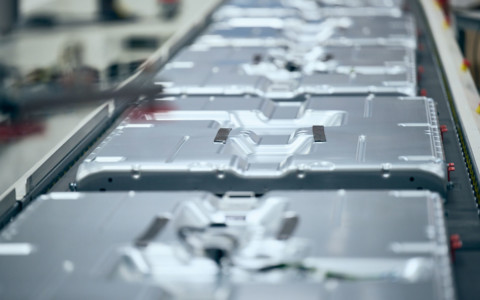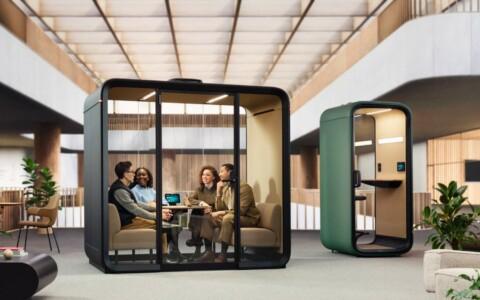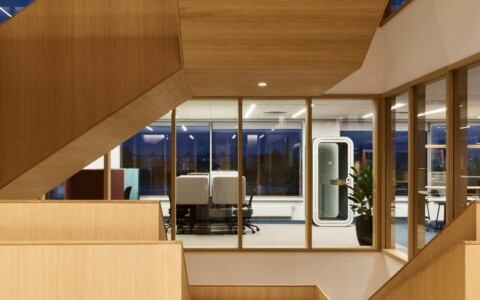The positive environmental impact and user safety of materials used both by businesses and consumers are nowadays more important than ever before. Meanwhile, the interest in sustainable building materials continues to grow. And it is not only different regulations that require certain standards to be met, consumers and the end users of products are demanding manufacturers to use better and more sustainable alternatives to materials such as plastic. Companies are also expected to be transparent in their use of materials and where the materials come from. At Framery, we are dedicated to choosing the safest and most environmentally sustainable raw materials for our products when possible without compromising their quality.
What makes materials sustainable?
The sustainability of materials is connected to their impact on the environment but also on people and communities. Sustainable materials should be environmentally friendly throughout their entire life cycle, starting from their production all the way to the end when they can be recycled. This is because many common materials deplete finite resources on the planet and the alternative to recycling them is producing more. This in turn leads to a larger carbon footprint of a product, in case its materials are not renewable or recycled.

Luckily many companies and manufacturers are moving towards a circular economy. By creating durable materials and products, manufacturers can ensure their longevity and remove the need to produce new materials as often. Manufacturers are also paying increasingly more attention to the safety of their products, for example by using non-toxic materials.
The sustainable materials in Framery’s soundproof office pods include materials that are renewable, recycled or recyclable, and safe.
- Renewable materials. During the life cycle of materials, their effect on the environment is often the greatest during their production. Renewable materials are ones that, as opposed to fossil-based and continuously depleting materials, can be grown or sourced from nature. Many renewable materials, such as wood, are also easy to dispose of after they are no longer needed.
- Recycled and recyclable materials. Products that are made from either partially or entirely recycled materials have a significantly smaller strain on the environment during their production. When using just the right recyclable materials, a product can continue living after it is taken apart and its different parts are recycled. For example, materials like steel and glass can be recycled to circulate them into new products. Plastic can be turned into new products when recycled correctly. For instance, the absorbing materials used in Framery pods consists of recycled PET-fiber. However, recycled plastic should not be used for everything because the quality of recycled plastic is often too low for some applications.
- Safe materials. Sustainability means more than just the environmental aspects of materials. The health of people who use the products is just as important. In order for materials to be safe, they cannot include any substances of very high concern nor emit air pollutants like VOC emissions. Another important quality of materials used in all products is their resistance to heat and fire. Non-flammable materials ensure that the products will not catch fire even when exposed to high temperatures and heat for long periods.
How is the sustainability of materials ensured?
The marketing of many brands is filled with great promises and bold claims about the sustainability of their products and the materials used in them. However, it can be difficult for consumers to distinguish truly sustainable actions from greenwashing. Fortunately, many external certifications can act as proof that products are produced using sustainable materials that are safe both for users and the environment.

Numerous certifications have proven that Framery office pods are both an environmentally friendly and safe solution for office soundproofing. Here are just some of the certifications and recognition our Framery office pods and booths have gained.
- EPDs: An EPD is a declaration verified by a third-party, indicating the environmental performance of a product. In order to be granted an EPD, a manufacturer needs to measure the environmental impact of its products in a transparent manner. The entire life cycle of the products is assessed in the EPD verification process. Currently, the Framery O, Framery Q, and Framery 2Q models have been granted EPDs by The International EPD® System.
- GREENGUARD Gold certification. We are particularly proud of this achievement, as all Framery office pods have received the GREENGUARD certification. On top of this, the Framery One was awarded the UL GREENGUARD GOLD certification level in 2021 as the first and only office pod in the world. The GREENGUARD certification does not concern the environmental impact of a product. Instead, it shows that our pods are scientifically proven to adhere to strict chemical emissions standards. Airborne chemicals can be a great risk to user safety and this certification is proof that Framery pods can reduce indoor air pollution and exposure to toxic chemicals.
- FSC, PEFC and EU Ecolabel certification. All Framery’s wood component suppliers are required to have either the FSC or PEFC certification. These certifications act as proof that the wood used in the pods comes from responsibly and sustainably managed forests. The fabrics used in Framery products have the EU Ecolabel which indicates that the materials have a reduced environmental impact during their life cycle.
- M1 Emission Certification. The soundproofing qualities of Framery pods are unrivaled and this is in part thanks to the high-quality acoustic foam used in our pods and booths. Framery pods have been tested in accordance with the M1 Emission certification. The acoustic foam used in Framery pods is made from 50% recycled, heatbound polyester fibers and complies with the certification’s criteria for emissions and odor. On top of that, the acoustic foam has been validated by the Finnish Allergy and Asthma Federation for its safety in use.
Framery office pods are a sustainable option for office soundproofing
Sustainability is more than just empty words for Framery. Read more about our product safety, certification, and sustainability in Framery’s Sustainability Report. In addition to our numerous certifications, read also how Framery office pods have been proven to have the best sound insulation according to the ISO 23351-1 standard.




